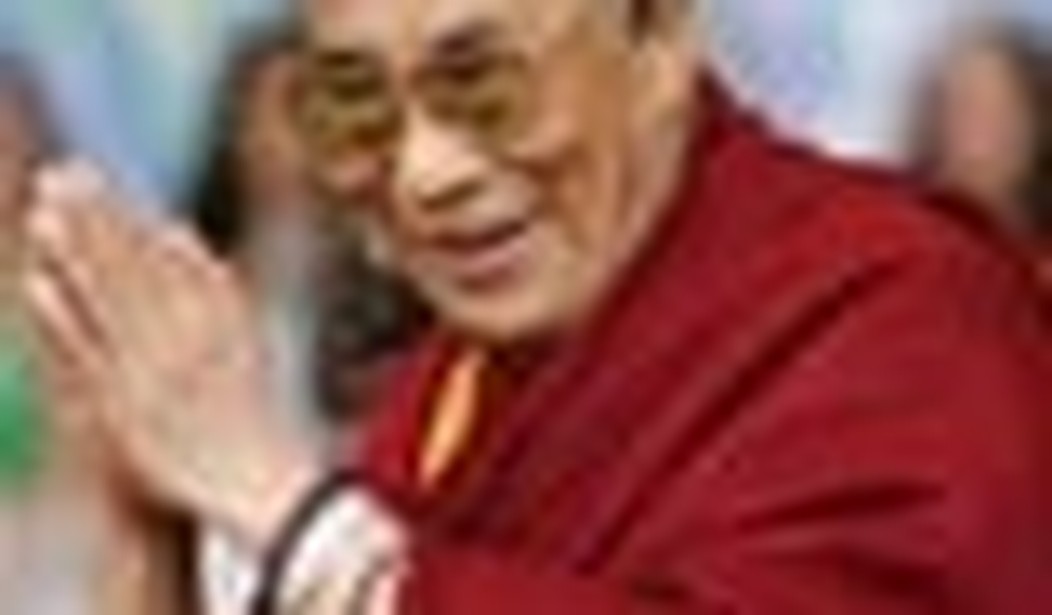He’s the darling of Hollywood celebrities, dazzling the likes of Sharon Stone, Harrison Ford, Steven Seagal, and Richard Gere. His soothing voice for compassion and mindfulness has inspired two big budget feature films: Seven Years in Tibet and Martin Scorsese’s Kundun.
So it was no surprise when his most recent confession registered barely a blip on the mainstream cultural radar, let alone outrage.
“I consider myself a Marxist,” the Dalai Lama declared during a talk in front of 150 Chinese students at the University of Minnesota in early May.
He injected a caveat: “But not a Leninist.” Whew. What a relief.
This wasn’t the first time the 14th Dalai Lama (Tibet’s most esteemed religious figure) proclaimed his allegiance to Marxism. Buddhism’s leading apostle to the West made a similar statement on May 20, 2010, in New York during a series of paid public lectures.
So how can the Dalai Lama possibly square his pleas for nonviolence toward “all sentient beings” with Marxism? His answer: Marxism has moral ethics, as opposed to capitalism, which is all about profits.
Let’s chew on that for a moment. Virtually every socio-political movement has some noble ambition — some set of ethics — that can be teased from its viscera. The Nazi Party platform, for example, contains calls for equal rights, profit-sharing, national health care, pensions, education access, employment opportunities, and the rights of citizens to select political leaders and make laws.
By implication, isn’t the Dalai Lama saying these are sufficient grounds to legitimize, exonerate — even embrace — Nazism? And if not, why not?
It’s one thing to promote cooperation and egalitarianism. It’s quite another to publicly endorse a specific ideology that espouses such goals but consistently delivers a dramatically different outcome. According to The Black Book of Communism, Marxist regimes over the 20th century systematically slaughtered between 85 and 100 million people. Millions more were terrorized, tortured, and enslaved. And these atrocities were not breaches of practical Marxist orthodoxy — they were critical elements of Marxist statecraft. Terror tactics and atrocities, The Black Book’s authors point out, are found in every regime claiming to be Marxist in origin.
The Marxist-Communist record is “the most colossal case of political carnage in history.” It represents the triumph of inhumanity over compassion on an unprecedented scale. How can this Nobel Peace Prize winner embrace a political ideology in theory without any consideration of its effects in practice? Is this mindful?
Buddhism, perhaps more than any of the other major religions, places special emphasis on compassion. It is incumbent upon the Buddhist to strive for mindfulness and compassion in all circumstances. Essential to this striving is the cultivation of an awareness of how ego aggressively disrupts mindfulness and compassion while denying the impermanence of existence. These aggressive disruptions cause suffering.
There is perhaps no other realm that engorges, fattens, and unleashes the aggressiveness of ego and its handmaiden, suffering, quite like the political realm. Yet the Dalai Lama doesn’t seem to consider this. He makes no mention of Marxism’s glaring internal contradictions. He glosses over how it fails to consider humanity as it is: beset with the confusion and ignorance of ego. He disregards the critical component Marxism requires to function successfully: a mythical human, one free of self-interest.
That’s why, for all of its seductive allure — its appeal to ego — Marxism has proved impossible to peacefully implement.
And while the Dalai Lama extols the supposed moral ethics of Marxism, he completely ignores its absence of a system of constraints. As Joshua Muravchik points out in Heaven on Earth: The Rise and Fall of Socialism, Marxism lacks an internal code of conduct to limit what its adherents may do in pursuit of its Utopian objectives. Welcome to Hell.
The Dalai Lama seems oblivious to other Marxist realities as well. He says he learned of the wonders of Communism through meetings with Mao Tse-tung, chairman of the Communist Party of China.
Mao flattered the Dalai Lama, telling him his mind was very sharp and logical. The Dalai Lama greatly admired Mao. That is until the chairman compared religion to “a poison.” Unforgivable. More unforgivable, it seems, than Mao’s systematic butchering of at least 50 million Chinese.
The Dalai Lama also apparently fails to appreciate how his celebrity endorsement lends moral cover to Marxist adherents and practitioners alike. As The Black Book points out, Eastern European dissidents have long argued that atrocities committed in the name of noble ideals are more perverse than those committed in the name of base objectives. It unleashes enablers, those millions of influential opinion leaders who flatter themselves for embracing Marxism’s lofty ideals while guiltlessly ignoring its destructiveness. Thus they perpetuated the atrocities. Marxist dictators got away with mass-murder on a breath-taking scale, decade upon decade, simply by trumpeting their humanism.
Finally, the Dalai Lama fails to see how his repeated denunciations of materialism contradict his embrace of Marxist philosophy. For central to Marxist theory is a materialist interpretation of history. Economics alone shapes politics, society, and human interactions. It drives the course of history.
The Dalai Lama has exhibited a “nuanced” relationship with materialism at other points in his life as well. As leaked documents from the U.S. State Department reveal, the Dalai Lama was on the CIA’s payroll to the tune of $1.7 million per year in the 1960s. The money was used to establish guerrilla-training camps and to build an armed Tibetan resistance movement to harass the Chinese. The operation even included a guerrilla training camp in Colorado.
So much for nonaggression, compassion, mindfulness. His Holiness has no robes.









Join the conversation as a VIP Member